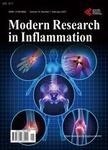Advanced Stage Stuck Gland Adenocarcinoma:Case Report
作者机构:Postgraduate Program in Medicine and Health Sciences of the Pontifical Catholic University of Rio Grande do Sul(PUC/RS)Porto AlegreBrazil Improvement of Higher Education PersonnelBrazil(CAPES)Distrito FederalBrazil School of Medicine of the Pontifical Catholic University of Rio Grande do Sul(PUC/RS)Porto AlegreBrazil School of Health and Life Sciences of the Pontifical Catholic University of Rio Grande do Sul(PUC/RS)Porto AlegreBrazil Celulare InstitutePetrópolisRio de JaneiroBrazil Undergraduate Nursing Course of the University of Santa Cruz do Sul(UNISC)Santa Cruz do SulBrazil Postgraduate Program in Health Sciences of the Faculty of Medicine of ABC(FMABC)Sao PauloBrazil Undergraduate Physiotherapy Course of the Vale do Salgado Faculty(FVS)CearáBrazil Physiotherapy of the Hospital Beneficiente Portuguesa of BelémParáBrazil
出 版 物:《Modern Research in Inflammation》 (炎症(英文))
年 卷 期:2020年第9卷第1期
页 面:1-7页
学科分类:1002[医学-临床医学] 100214[医学-肿瘤学] 10[医学]
基 金:funded in part by the Coordination of Improvement of Higher Level Personnel—Brazil(CAPES)—Finance Code 001 by the National Council of Scientific and Technological Development—Brazil(CNPq)—Doctorate GD by Research Foundation of the State of Rio Grande do Sul(FAPERGS)
主 题:Parotid Neoplasms Cancer of the Parotid Palliative Care Critical Care
摘 要:Parotid gland adenocarcinoma is commonly a tumor of low malignancy and low incidence worldwide. The reported case shows the rapid progression of this tumor in an elderly patient and infrequent effects, such as a presentation of facial edema not commonly described in the medical literature. Patient was admitted to hospital in November 2019 with secretion and partial hearing loss in the right ear and infiltrative and stone lesion with initial skin ulceration in the right cervical region. After 42 days, he returned and was admitted to the intensive care unit with significant swelling of the face, hardened and hyperemic neck, difficulty in speech and inability to open the eye. He presented changes in the mobility of the speech and hearing organs, reduced laryngeal mobility, vocal changes, speech with altered articulation and severe oropharyngeal dysphagia with risk of bronchoaspiration. The patient was diagnosed in September 2019 with a parotid tumor (salivary gland adenocarcinoma T4). The medical team requested computed tomography, computed tomography angiography of the chest and cervical vessels and computed tomography of the neck, in addition to evaluation by the head and neck surgery service and general surgery. After analyzing the results, the medical team suggested a hypothesis of tumor invasion that could result in obstruction of local lymphatic drainage, something unusual in the evolution of this type of tumor. In addition, it was not possible to adhere to radiotherapy treatment due to the extent of the lesion and there was also no confirmation of metastases. The reported case shows us that parotid gland adenocarcinoma, when diagnosed in an advanced stage, can limit the approach to treatment. It was chosen in agreement with the family to proceed with palliative care without invasive measures. Palliative care may be the best option for cases like this, bringing some comfort to the patient and his family.



